Posts Tagged ‘MTG’
This week in Magic: Making Day 2 of GP Boston-Worcester
Thursday, July 31st, 2014
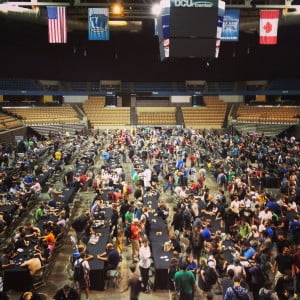
This past weekend was definitely a good weekend for me. In case you missed it, I made Day 2 of GP Boston-Worcester. It was so much of a surprise to myself that I was not at all prepared. I was such a mess that day, I didn’t even have a belt, and my pants were falling all day. Long story-short, I am in the middle of a move and my belt is in storage.
Not only was I missing a belt, but when I made Day 2 I was in scramble mode to find a place to sleep since my buddy Josh didn’t make it and wasn’t planning on driving into Worcester from the South Shore again. I was lucky enough to have a couple of offers to crash on the floor of friends’ hotel rooms. (Thanks to both Carl and Jason, by the way).
It should be no surprise what I played at the GP. If you’ve been following me for a while now, you’d know that I played Mono Red Burn. I went 7-2 on Day One, and unfortunately finished 2-3 on Day Two. While I missed out on cashing, I was just happy to make Day Two, as well as many of my other friends.
The journey to this point was not easy. I did a fair share of testing, and while testing, I got my fair share of stares and losses. There were times I felt defeated playing this deck. Day Two was never in my sights. I didn’t even pack a bag. Still, I managed to persevere. For your enjoyment, here is the list I ran:
Mono Red Burn aka 20 Mountains
Main Board:
4x Goblin Guide
4x Hellspark Elemental
4x Eidolon of the Great Revel
4x Lightning Bolt
4x Lava Spike
4x Shard Volley
4x Searing Blaze
4x Rift Bolt
4x Skull Crack
4x Flames of the Blood Hand
20x Mountain
Side Board:
3x Combust
2x Relic of Progenitus
2x Anger of the Gods
2x Molten Rain
3x Shattering Spree
3x Searing Blood
Hellspark Elemental was a last minute change over Spark Elemental. After some playtesting with my friend Jay, I had come to the conclusion that Spark Elemental was missing something. That something was being able to use itself over again. Hellspark Elemental’s ability to Unearth itself is huge. You’re essentially running eight of them.
I came across a nice variety of decks at the GP. In fact, during Day One, I played against two 8Rack decks. My two losses came against Merfolk and Fairies. I’ve never had a good run against Fairies, even when the deck was in Standard. I also did not test against it much outside of the tournament. My wins came against Jund, 2x 8Rack, 2x Scapeshift, GB, and UR Twin. Aside from the Twin match, the other decks were great opponents for me. As for my Twin matchup, he got land screwed game one, and then I just out burned him game two. He was gracious in his loss, and wished me luck after the match.
I should add that my two losses were within the first four rounds of the day. Thus, I had to win out the entire day. I definitely felt the heart palpitations coming on near the end of the final match. It went to third game, and thankfully I won it.
Day 2 was a little rough for me. Round one had me against my worst matchup in round one, Ad Nauseum. My only two wins came from another 8Rack match and a Jund match. The losses came from Ad Nauseum, Affinity (which was a heartbreaker for me), and Twin. Those last two losses were very close. Both my opponents let out big sighs of relief. Although, I’m not sure if it was because the matches were close, or they didn’t want to lose to Mono Red Burn. It could have been a combination of both.
Overall, I had a good time at the event. I mean, if you make Day 2, then there isn’t much to complain. Especially if you’ve never done it before. Sadly, I have been sick the past several years that a GP has been in the area – whether it was in Massachusetts or in Rhode Island. One year I made showed up on the second day of GP Boston the last time it was held in the Hynes Convention Center. However, I was so sick that day, I don’t remember much of it.
There were some things to be said about the GP on a finer level, but I’ll save that for another time.
Making changes to the deck
You already know I changed my Spark Elementals to Hellspark Elementals. There is very little I would change in the deck. If you’re looking for a very budget deck to run in Modern that has a good shot of winning a small sized tournament, this is your deck. If I were to run it in another major tournament, maybe something that is coming up in a couple of weeks, I would definitely throw in fetch lands. I would need to do more testing before I suggest running four or eight fetch lands, but, either way, they need to be run. The main reason: Searing Blaze.
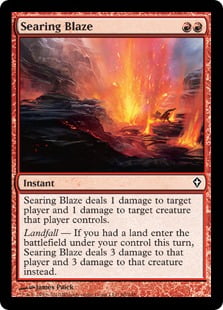
This card can really make or break the deck. Alone, it can be both the best card in the deck and it can be the absolute worse thing ever. It all depends on the landfall trigger. Even then, you can only cast this card on your turn. Thus, you’re never able to take full advantage of the spell. I’m sure if I had fetchlands in this deck, it would have run a lot more efficiently. I would have been able to thin the deck out and almost guaranteed I would have a way to trigger landfall.
In the end, the call is yours. Just remember it can mean the difference between a $50 deck and a $410 deck.
About the author
Simeon is now the Community Manager for Battleground Games & Hobbies. If you have any questions or inquiries, then you can reach him at Sims@battlegroundgames.com. He is also an avid gamer who loves to play board games and video games. He graduated college with a degree in Political Science, and now serves the public by writing about games. You can check that out here. Don’t forget to “like” him on Facebook as well. It’ll update you on all of his newest content. Best of all, you can follow Simeon on Twitter (@SimeonCortezano) for some real time hilarity. Thanks for reading!
Donate to the Extra-Life fundraiser!

Join the Battleground Games & Hobbies community forums!
Please don’t forget to check us out on Facebook and follow us on Twitter @battleground_gh!
Tags: gp boston-worcester, Magic the Gathering, Modern, MTG, Simeon Cortezano, Wizards of the Coast
Posted in Blog, Card Games, Events, Featured Author, Featured Post, Magic: The Gathering, Popular Posts | 3 Comments »
Wizards of the Coast Announces Sweeping Changes to ‘Magic’ Organized Play
Wednesday, July 30th, 2014
Wizards of the Coast announced yesterday sweeping changes to the Magic the Gathering organized play program as a result of unprecedented growth in both it’s Grand Prix program and Pro Tour Qualifier programs. Based upon feedback from the community at large, including judges, players, and local-game-store’s alike, the following changes were announced:
A New Path to the Pro Tour
The take away:
- New path to the Pro Tour will now feature a two-tier event series to qualify – a Preliminary PTQ feeding a Regional PTQ;
- Winners of Preliminary PTQ’s are invited to participate in the Regional PTQ;
- Preliminary PTQ’s will be run by local game stores;
- Qualified players may play in any Regional PTQ they wish;
- The top four finishers of the Regional PTQ qualify for the Pro Tour, including airfare;
- If a Regional PTQ has 128 participants or more, the top eight players qualify for the Pro Tour instead.
Improving Grand Prix Events
The take away:
- Amount of Grand Prix events increased from 46 to 54;
- The top eight (top four for a team event) will receive invitations to the Pro Tour regardless of event attendance;
- Everyone with 39 match points – or a record of 13-2 – will qualify for the Pro Tour;
- Total prize pay out increased to $70,000 if attendance is 3600 or more.
Changes to the Pro Player’s Club
The take away:
- Pro Points at Pro Tour’s will now be awarded based upon final match point score instead of final swiss standing beyond the top eight;
- Pro Points at Grand Prix events will likewise now be awarded based upon final match point score beyond the top eight;
- Players at the Pro Tour finishing with 33 match points or more will receive an invitation and airfare to the next Pro Tour;
- Minor changes to the threshold needed to reach Platinum Pro-level status;
- Gold Pro-level no longer awards a $500.00 appearance fee. Instead, Gold Pro-level now awards airfare to all Pro Tours for the season.
What do you think of these sweeping changes? Is this better for the Magic the Gathering organized play program or worse? Tell us what you think of the new changes effective beginning in August in the comments below!
Tags: Changes, Grand Prix, Magic the Gathering, MTG, Organized Play, Pro Tour, Pro Tour Qualifier, PTQ, Wizards of the Coast, WOTC
Posted in Blog, Card Games, Events, Featured Post, Magic: The Gathering, Popular Posts, Store Related | 1 Comment »
‘Magic the Gathering’ at San Diego Comic Con
Tuesday, July 29th, 2014
Every year at San Diego Comic Con (SDCC), Wizards of the Coast always makes some amazing announcements for upcoming products. This year, they did not disappoint. Check it out!
Here’s some other sweet tidbits announced at SDCC:
From the Vault: Annihilation will be released August 22 and will include Armageddon, Wrath of God, Rolling Earthquake,Cataclysm, and Living Death.
Unknown products were announced too: The original four Duel Decks will be released as Duel Decks: Anthology. These were Jace vs. Chandra, Elves vs. Goblins, Divine vs. Demonic, and Garruk vs. Liliana.
Khans of Tarkir is going to be a large set—small set—large set block structure (like Innistrad, Dark Ascension, and Avacyn Restored, with a special consideration for Limited and “a time travel element” yet to be revealed.
Tarkir itself is a plane of five warring clans, each worships a different aspect of the plane’s (now extinct) dragons.
There will be more than just the clans on Tarkir: Djinn, Efreet, and Bears will be featured.
Seeded Prerelease boxes are returning, one for each clan, but this time the Prerelease promo for each will be one of eight different cards at random, easing some of the “one seeded box is much better for Limited than the others” concerns from recent prereleases, and hopefully resulting in more a even selection of boxes.
Finally, each clan will have its own mechanic, with morph returning for the block.
So, what do you think of this exciting announcement? What are you most excited about? Let us know in the comments below!
Tags: Commander, Duel Decks Speed Vs Cunning, From the Vault Annihilation, Khans of Tarkir, Magic Panel, Magic the Gathering, MTG, San Diego Comic Con, SDCC, Wizards of the Coal
Posted in Blog, Card Games, Featured Post, Magic: The Gathering, Popular Posts, Store Related | No Comments »
GP Boston-Worcester Top 32 Deck List: U/B Teachings by Carl Godon
Monday, July 28th, 2014
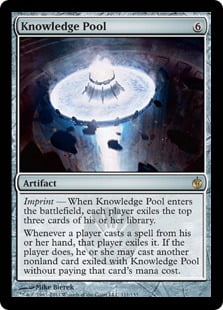
In case you missed it, GP Boston-Worcester came and went this past weekend. Several of our local players went on to make Day 2 of the event, including Nick Blake and myself. Carl is a local player who frequents the Abington store. He’s well know for his “unique and interesting” deck lists. So, it’s no surprise that people are wanting to know what he played this past weekend to a Top 32 finish at GP Boston-Worcester. It even peaked some interests when his deck got tweeted about. Here’s the list:
Creature:
3x Snapcaster Mage
2x Teferi, Mage of Zhalfir
1x Treasure Mage
1x Wurmcoil Engine
Sorcery:
3x Thoughtseize
2x Inquisition of Kozilek
1x Damnation
Instant:
1x Repeal
1x Smother
2x Disfigure
1x Hero’s Downfall
1x Darkblast
1x Mystical Teachings
2x Mana Leak
1x Consume the Meek
1x Slaughter Pact
1x Syncopate
2x Far//Away
3x Cryptic Command
2x Spell Snare
2x Think Twice
Artifact:
1x Knowledge Pool
Land:
1x Misty Rainforest
2x Scalding Tarn
3x Tectonic Edge
2x Dreadship Reef
2x Snow-Covered Swamp
4x Snow-Covered Island
4x Watery Grave
4x Creeping Tar Pit
2x Dark Slick Shores
1x Urborg, Tomb of Yawgmoth
Sideboard:
1x Devour Flesh
3x Pack Rat
1x Duress
1x Tectonic Edge
1x Thoughtseize
1x Mindbreak Trap
1x Grafdigger’s Cage
2x Shadow of Doubt
2x Threads of Disloyalty
1x Damping Matrix
1x Ashiok, Nightmare Weaver
That’s a lot of one-ofs and two-ofs, but it definitely looks like a “Carl” deck as we like to say. The most interesting part of the deck is Knowledge Pool, and, yes, you’re reading the deck list correctly. There is only one copy in the deck. Some of you who follow Jackie Lee on Twitter may have seen her post about how her “opponent casually” locked her out of the game with Knowledge Pool.
Opponent casually comboed me out with Teferi/Knowledge Pool. No big. 11-4 #GPBoston
— Jackie Lee (@JackieL33) July 27, 2014
The obvious question people had was, “What’s Knowledge Pool?” The next question was how Carl locked people out of the game with the card. The short version of the card is this: when the card is played, both players must exile the top three cards of their library. This is through the card’s “Imprint” mechanic. The card goes on to say that, now, whenever a player plays a spell, that spell is exiled. If the player exiles the card, they can cast any card that was originally exiled by Knowledge Pool and play it without paying it’s casting cost.
Sounds great, right? Well not if Teferi is in play. Confused? It’s okay. We all are. The lock is so obscure, I even had trouble forming words to explain it. Here is the best explanation thanks to the internet. “Knowledge Pool’s triggered ability is on the stack at the time they could cast an exiled spell from it, as the stack is not empty, that player could not cast a sorcery at this time. Thus they cannot cast any spells at this time due to Teferi’s effect, meaning knowledge pool exiles any spell not cast from hand without any return for opponents. So they only spells they cast not from hand (flashback for instance or via madness) can resolve and also land drops are unaffected.”
The strategy actually originates from EDH. This was one of the most interesting facts I found out while researching about the lock.
Well that’s it for now. I’ll be writing about my own experiences from this past weekend’s events, and, if you’re lucky, maybe we’ll even get Nick to talk about his time at the event as well.


Tags: carl godon, gp boston, Magic the Gathering, MTG, teachings, Wizards of the Coast, worcester
Posted in Blog, Card Games, Events, Featured Post, Magic: The Gathering, Popular Posts, Store Related | No Comments »
GP Boston-Worcester Preview: Mental Challenges by Dylan Klett
Friday, July 25th, 2014
Hey everyone!
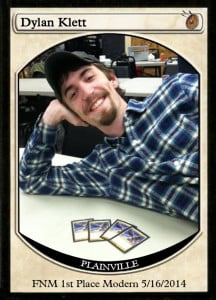
Grand Prix Boston (which is secretly Grand Prix Worcester, for those who haven’t been before) is coming up this weekend, and I’m very excited. Not only is this the same venue where I attended my first Grand Prix ever, but instead of the format being M13 Sealed like the last time I was able to attend, it’s Modern!
Modern is the format I most enjoy playing; I feel like the youth of the format combined with the enormous card pool lends itself to some really sweet game states, and it feels like there’s plenty of room for innovation.
Instead of talking about specific cards or decks today, I wanted to take some time to go over some of the more subtle challenges you’ll encounter as a player at a competitive tournament of any size (although this will be especially true at one as large as a Grand Prix). These are often challenges to your mindset, or obstacles that have little or nothing to do with your skill as a Magic player. Your ability to deal with them can sometimes be the difference between coming away from a tournament feeling like you had a great day and a positive experience, or wishing you had spent the time doing literally anything else.
Be prepared for mental fatigue
This becomes particularly relevant when you get into the later rounds, where both you and your opponent have been playing Magic almost non-stop for the past five, six, seven or more hours. Abundant playtesting will be greatly rewarded here; the less you need to think about the fundamental lines of play and choices your deck will present you with, the more brainpower you will conserve in the long run to deal with those tough, win-or-lose situations.
The more familiar you are with the format and your deck, the better. Make no mistake, you will get tired, and the temptation will be there to just jam your cards in the most straightforward way possible. Try to slow down, catch yourself before doing this, and force yourself to think your options through. It will pay off. Nothing makes you walk away from a match feeling quite as miserable as losing to a mistake you would never have made in round one.
Keep the smaller picture in mind
While playing your match, try to block out as much information as possible from coming in that isn’t relevant to the match. Don’t bother checking the text from your friend to see if they’ve won their match or not, don’t worry about what the players next to you are arguing with a judge about.
Don’t think of the match in front of your in terms of how much if left – if you let yourself worry about how many more matches you have to win, you will focus on results, stress yourself out, and risk losing the focus necessary to win the game at hand. Boil your concentration down to a single goal: there is a match of Magic in front of you, right now, and you’re here to win it. Do it.
Keep the bigger picture in mind
Gerry Thompson wrote an article recently where he described all Magic played competitively or with “a mind to get better” as “one big session.” This has stuck with me over the past week or so; I really like the way this is phrased, and the mentality that this implies. Magic is an endlessly complex and difficult game, and to do well requires of us not only that we learn, but that we learn well.
We must put a conscious effort into our improvement as players, and a large part of this means maintaining an openness to being wrong, to making mistakes, and to stop doing something we are comfortable with in favor of doing something new. We must re-evaluate ourselves. Most importantly, it means failing, and failing even when we feel most sure that we can not or should not.
It’s great to win and winning feels great, but when we win, it is easy to gloss over mistakes we may have made on our way to victory, because we got the result we wanted. The real prize is always noticing something you could have done better, and realizing that you will make that decision better next time. When we lose, we are forced to do this — if not by our curiosity, then by our pride.
When playing at an event and you lose in frustrating fashion — that lucky topdeck the turn before they would have died, or your opponent drawing their one sideboard card against you and you not seeing a single one of seven you put in — it’s fine to feel angry, but keep it to yourself or your close friends, let it pass, and let learning from that loss take its place.
To wrap things up, let me give a sweet example:
At a PTQ I was playing a couple weekends ago, I was playing UB Faeries against Splinter Twin in Round Seven. This is an awesome matchup for me, and I know it — the only thing I know I need to watch out for is Blood Moon out of the sideboard, which can completely ruin me if he gets a chance to resolve it. Other than that, it’s very difficult for the Twin player to win, and one of the reasons to play Faeries in the first place.
Game One goes about as planned: I play a Bitterblossom, cast a couple discard and counter spells, and kill him before he can get even close to the combo. Game Two starts off much the same, and I feel very confident; I play turn one discard spell, turn two Bitterblossom, turn three Vendillion Clique, and pass turn four holding up my hand of one Smother, one Dismember. I know his hand is two Pestermites and a Splinter Twin. At my end step, he plays one of his Pestermites. I kill it using Dismember, paying four life despite having four lands available so I can bluff the maximum amount of other possible tricks. I know every card in his hand, and my last card deals with it nicely. He’s dead in two turns. What could go wrong?
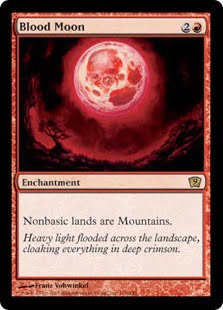
Blood Moon. That’s what.
Suddenly, I am locked out of casting my Smother because my three basic Swamps in the deck had zero of them in play (which is of course, completely reasonable). My opponent breezily deploys his last Pestermite at the end of my next turn and casts Splinter Twin on it while at three life, with my Smother in hand and helpless to resist. Initially, I was frustrated. I had played as much disruption as it was possible to play against one of my best match-ups and still lost to what felt like dumb luck.
Blood Moon is a stupid card, I wanted to rant. Why is it legal in Modern? It never leads to fun games.
It took me about 10 minutes of being on 45-degree tilt before I realized how I could have won that game, Blood Moon be damned. If I had cast Smother instead of Dismember on his first Pestermite, using my black spell while I still had black mana, I would have still had Dismember in hand when my opponent plucked that Blood Moon off the top of his deck like a ripe fruit. Go ahead, cast your Splinter Twin. I’ll tap my newly minted Mountain and pay four life. Kill it. Kill you. No black mana required.
Instead, I let my confidence in the matchup and my exceptional series of draws cloud my judgment, and I allowed myself to stop thinking of what could make me lose this game. When I stopped thinking about how I could lose, I stopped playing around it. And I lost.
If that isn’t proof that Magic is a wonderful game, I don’t know what is.
About the Author
Dylan Klett is a local competitor who can usually be found at the Plainville store for Friday Night Magic. To request more articles by Dylan, let us know by emailing Sims@battlegroundgames.com
Join the Battleground Games & Hobbies community forums!
Please don’t forget to check us out on Facebook and follow us on Twitter @battleground_gh!
Tags: Dylan Klett, Magic the Gathering, Modern, MTG
Posted in Blog, Card Games, Featured Author, Featured Post, Magic: The Gathering | 2 Comments »
Tempo-Twin for Grand Prix Boston-Worcester
Friday, July 25th, 2014
Greetings Magic the Gathering fans. This is my first actual article for Battlegroundgames.com and in it, I’m excited to be writing about the ever-evolving Modern format — a format I use to very much dislike. Thankfully, I found an archetype I can get behind and now fully support this really interesting format. Can you guess what it is?

Yup, that’s the one – Splinter Twin; the Blue-Red Tempo version, to be exact. There’s nothing more exciting that creating four-billion 2/1 or 1/4 creatures! This will be my weapon of choice for Grand Prix Boston-Worcester 2014 tomorrow morning.
The deck plays essentially like a control deck with a combo finish, utilizing the Splinter Twin (or Kiki-Jiki) plus Deceiver Exarch or Pestermite combo in order to make an infinite amount of token creatures. Here is the final decklist and sideboard:
Land:
5 Island
1 Mountain
4 Scalding Tarn
4 Misty Rainforest
1 Desolate Lighthouse
1 Stomping Ground
4 Steam Vents
3 Sulfur Falls
Creatures:
4 Deceiver Exarch
2 Pestermite
1 Kiki-Jiki, Mirror Breaker
4 Snapcaster Mage
2 Vendilion Clique
1 Spellskite
Spells:
4 Splinter Twin
2 Electrolyze
2 Flame Slash
4 Lightning Bolt
1 Dispel
2 Cryptic Command
4 Remand
4 Serum Visions
Sideboard:
2 Anger of the Gods
2 Blood Moon
2 Ancient Grudge
2 Keranos, God of Storms
1 Counterflux
1 Negate
1 Echoing Truth
1 Dispel
1 Batterskull
1 Vedalken Shackles
1 Spellskite
Essentially, a fairly standard list, all things considered. When compared to most other versions out there, I have an extra Steam Vents (for the Vedalken Shackles in the sideboard); only one Spellskite; an additional Electrolyze; and no Peek/Gitaxian Probe. Spellskite seems to be increasingly mitigated of late as a lot of matchups are increasingly prepared for this card. However, having an 0/4 blocker can be useful and it’s redirect ability is still randomly useful and has a wide range of applications. Electrolyze has been amazing lately and I play the deck as a control deck that wins with a combo; Electrolyze helps with that goal. Finally, Peek/Probe felt far too low impact and often times, regardless of knowing my opponent’s hand, my lines of play were the same regardless.
Why Splinter Twin?
This goes back to Grand Prix Richmond 2013. After the banning of Deathrite Shaman, I immediately gravitated toward the Blue-White-Red Control deck that Shaun McLaren won Pro Tour Born of the Gods with. I’m a control player at heart and this deck felt perfect to me. Despite this, I put up a very disappointing 2-1-2 record and dropped, disappointed. What happened? The metagame had shifted; Lightning Helix just wasn’t cutting it and the deck has an awful lot of trouble actually finishing a game (hence the draws). So, I went back to the drawing board.

Never underestimate this little guy.
I knew I wanted to play something powerful, especially given the amount of combo decks in the format. I owned all the cards for Splinter Twin and I played the deck when it was Standard-legal. With that, I didn’t see that I had any other choice; Splinter Twin it is.
Ultimately – aside from card availability and basic familiarity – I chose the deck because it’s inherently powerful, consistent, and has positive match ups against the other combo decks (though Scapeshift is a bit closer) and Affinity. Furthermore, the mana is solid and allows for the use of Blood Moon (a very powerful trump in a lot of matchups, especially the Jund/Junk/Rock decks). I briefly tried the Tarmo-Twin deck popularized by German professional Magic player Patrick Dickmann, but I hate losing to my mana base, despite gaining some powerful cards and – I think – a better sideboard. Overall, consistency goes a long way to generating wins, especially in long tournaments.
Fin
I’m excited to be doing battle with Splinter Twin and very much looking forward to the Grand Prix. I’ve put a lot of practice into the deck, so I feel confident for big things. Wish me luck and look forward to an after-action report following the Grand Prix! If you’re in attendance, please say hello!
About the Author
Chris Alexander is the Online Store Manager for Battleground Games & Hobbies. He has a vast amount of experience in the industry having stints with other major internet companies. He is a lover of games and Islands. He dislikes Mountains and anything associated with them except for Splinter Twin. When he is not playing “Magic: The Gathering” or board games, he can be found with his two loving dogs; typically cleaning after them.
About Battleground Games & Hobbies
| |||||
| |||||
Tags: Grand Prix Boston-Worcester 2014, Magic the Gathering, Modern, MTG, Splinter Twin, Tournament
Posted in Blog, Card Games, Events, Featured Author, Featured Post, Magic: The Gathering | No Comments »
- Products
- Buylist
- Policies
- Contact Us

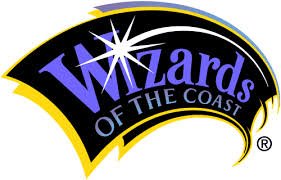
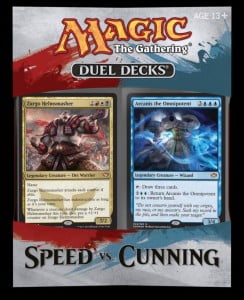
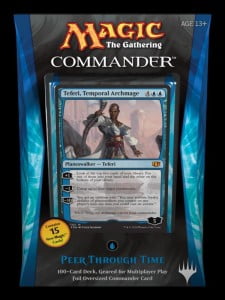
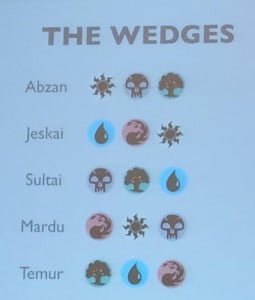






Social: